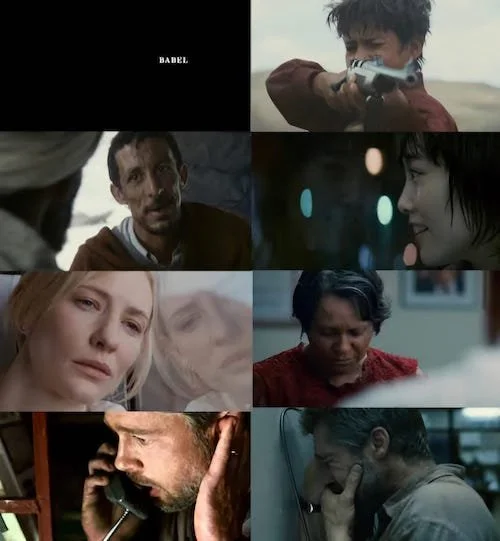Babel
Written by Octavio Carbajal González
There’s an old story — part myth, part warning — about how we humans once spoke the same language. No subtitles, no missed meanings, no misinterpretations. Just one voice for all of us, enough to build a tower to the sky. But when we got too close to heaven, the story goes, that voice was shattered. Language fractured into pieces. Humanity was scattered, not just across geography, but across perception. The story of the Tower of Babel still lingers — not in ancient texts, but in the spaces between people: in what gets lost in translation, in the pauses between one language and another, in the way we reach out and miss.
Alejandro González Iñárritu’s Babel (2006) doesn’t retell that tale — it inhabits it. Without referencing it directly, the film understands the grief of disconnection better than most. By this point, Iñárritu had already emerged as one of the most distinctive voices in contemporary cinema, with Amores Perros (2000) and 21 Grams (2003) establishing his signature style: nonlinear storytelling, emotional intensity, and an existential concern with fate and suffering. Babel marked both a culmination and an evolution of those early works — a film that expanded his intimate fixations onto a global scale. In the years that followed, through films like Birdman (2014), The Revenant (2015), and Bardo (2022), he continued to explore themes such as the limits of endurance, the slippery boundary between ego and art, and the language of survival. Across radically different settings, his cinema has remained devoted to fragmentation — of time, of language, of the self — always circling the deep ache of disconnection. As Czech writer Milan Kundera once wrote, “The struggle of man against power is the struggle of memory against forgetting,” and Iñárritu’s work echoes this relentless fight to hold onto what slips away.
What begins in Babel as a random event and a seemingly harmless gesture — a hunting rifle gifted from Yasujiro (Kōji Yakusho), a Japanese businessman, to his Moroccan guide, Hassan Ibrahim (Ahmed Abdelhafid) — becomes the first tremor in a catastrophe that ripples across continents. The rifle eventually lands in the hands of Abdullah (Mustapha Rachidi), a humble goatherder who lives with his family in the arid expanses of rural Morocco. In a gesture meant to protect their herd from jackals, Abdullah passes the weapon to his two sons, Yussef (Boubker Ait El Caid) and Ahmed (Said Tarchani). Still children, driven by boredom, the boys treat the rifle like a toy. One morning, from the slope of a hill, they test its range by aiming at a distant tour bus. They do not mean to harm, but the bullet finds its mark: it strikes Susan (Cate Blanchett), an American tourist asleep in her seat. What follows isn’t just the story of her injury, but the widening circles of misunderstanding it sets into motion. Susan’s husband, Richard (Brad Pitt), is thrown into a crisis he cannot control. Their trip to Morocco was meant to help them recover from the death of their infant son — a loss neither of them knows how to speak about. Richard, stubborn and emotionally barricaded, suddenly finds himself pleading in a language he doesn’t speak, surrounded by strangers in a village without phones or doctors. Pitt plays him with a kind of weathered, shocking panic.
Thousands of miles away, in San Diego, California, their two young children are in the care of Amelia (Adriana Barraza), their longtime nanny. She has been with the family for years — deeply loved and trusted, yet often invisible, caught in the shadows that many immigrants endure. When unexpected news delays the couple’s return, Amelia makes a difficult yet tender choice: she takes the children across the border to attend her son’s vibrant and heartfelt wedding in Mexico. The celebration bursts with color, music, and chaotic warmth — a brief sanctuary of joy amid uncertainty. But beneath the surface of festivity, tension quietly builds. Amelia’s nephew, Santiago (Gael García Bernal), charged with driving her and the children back across the border, succumbs to panic in a critical moment with border authorities, setting off a devastating chain of events. Barraza’s performance captures Amelia not as a mere victim or heroine, but as a dignified woman navigating a system structured to misunderstand and marginalize her.
Interwoven stories crossing borders, where love, grief, and human connection echo in a world shaped by barriers and silence
And in Tokyo, far removed from the geography of the crisis but tangled in its roots, we meet Chieko (Rinko Kikuchi), a teenage girl adrift in silence. Deaf, grieving her mother’s recent suicide, estranged from her father Yasujiro— she becomes Babel’s most internal earthquake. Her world is one of proximity without intimacy. She moves through Tokyo’s neon streets and sterile offices, aching not just for connection, but for recognition. Kikuchi’s performance is a revelation — not for how loudly she cries, but for how much she contains. Her longing isn’t just emotional; it’s existential. She wants someone to look at her and see her. Not as a broken girl, or a body, or a burden — but as a presence.
The common thread between these stories is not narrative symmetry — it’s a shared fragility. A sense that no matter where we are in the world, we are all susceptible to the same human failures: the impulse to protect, the desperation to belong, the ache to be heard. Rodrigo Prieto’s cinematography treats each location like its own consciousness. Morocco’s wide stillness evokes spiritual isolation. Mexico vibrates with warmth and volatility. Tokyo is sterile, disorienting, fluorescent. And California, for all its comfort and privilege, feels oddly detached. Gustavo Santaolalla’s score doesn’t command attention — it lingers in the background like grief itself, subtle but inescapable. His music floats between scenes like a memory that won’t dissolve.
What makes Babel extraordinary is that it refuses to assign blame. The film isn’t about villains or heroes — it’s about how fragile human communication really is. Misunderstandings happen not because people don’t care, but because care alone can’t transcend language, class, or culture. A gift becomes a wound. A decision made in love becomes an act of trespass. A glance is misread, a silence misunderstood. In the end, the film resists moral clarity. It doesn’t tell us how to fix the world. Instead, it leaves us inside the ache. The ache of Amelia’s panic, the ache of Richard cradling his wounded wife in a foreign land, the ache of Chieko reaching out to the world with a body she no longer trusts. There is no catharsis — only the sense that we are always at risk of being misunderstood, always one gesture away from losing or finding each other, and finally, a quiet recognition of how much we live at the mercy of things we cannot name: systems, silences, shadows. It’s clear that we may never rebuild the tower of Babel, but maybe we can learn to listen more closely in the ruins.
Octavio is a passionate cinema enthusiast from Mexico City, he mostly enjoys watching arthouse films from all over the globe. His reviews are published on "Vinyl Writers" (www.vinylwriters.com).







